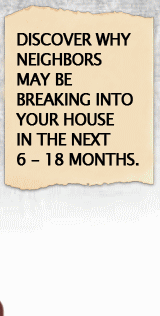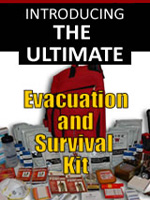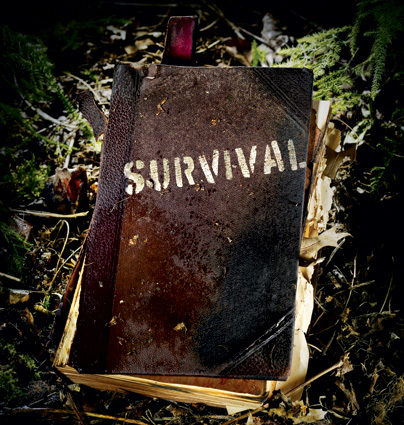Gaye Levy, Contributor
Activist Post
Nelson Mandela once said: “It always seems impossible until it is done”.
This reminds me of prepping. At the beginning, the task of prepping seems impossible. But once you start – and once you really get going – the process does not seem so hard and most definitely seems possible.
Now don’t get me wrong. Talk to any prepper and he or she will tell you that the job is never done. Oh sure – you eventually acquire enough gear, enough water and enough food to get you by for three days. Next, you work on being prepared for a week, then a month and ultimately, for many, it becomes prepping for six months or a year. And even then the job is not done. There are new skills to learn, old skills to fine tune and well, before you know it, a whole new checklist of stuff to buy.
This month I want to remind you that it is perfectly okay and even preferable to start slow as we have done with our one-month-at-a-time prepping series. Try to think of yourself as a little fish in a big pond. You are growing and with each month you become stronger and more able to fend for yourself. Like the little fish, you take on what you can handle when you can handle it so as not to exhaust yourself physically or financially. At the same time, you stay nimble and alert and ready to make a quick decision should the big fish try to swallow you up.
A lot has happened in nine months – both in the world and in our little prepping school.
Natural disasters have occurred, random acts of violence have proliferated, and around the world, cities and even countries are facing total economic collapse. And yet amid the chaos, I would like to think that my school of little fishes has matured a bit, gaining the confidence needed to weather the storm no matter what. And with this confidence, I would like to think the fishes have begun to find other even smaller fishes that they, too, can help educate.
But I get ahead of myself. Let’s see what we need to get prepared in month 9.
SUPPLIES & GEAR:
- Duct tape
- Extra batteries for flashlights, radio and hearing aids (if needed)
- Add an additional 3 days of water to your supply per person and per pet
The Magic of Duct Tape
You need duct tape. And lots of it. Duct tape has so many uses that entire books and even websites and blogs have been set up to extol its virtues. This month you are going to add a roll (or two or three) to your emergency kit.
First let me give you a brief history of duct tape. This miracle stuff was created during World War II when the US military needed a flexible, durable, waterproof tape to use making repairs in the field. A strong tape was created by Permacell, a division of Johnson and Johnson for this purpose. As the story goes, the GIs called it “duck tape” because it was waterproof – like a duck’s back.
Duct tape, as it is now called, is handy stuff that can be used to temporarily repair a broken window, hold together broken parts on gear in your survival kit, serve as an emergency compression bandage or sling in your first aid kit and, along with plastic sheeting or tarps, create an indoor tent to shelter in place. Duct tape can also be used to repair ripped clothing or a torn backpack and it can even be used as a fly-catcher. And that is just a start.
 It is typically sold in rolls of various lengths starting at 10 yards up to 60. (Be sure to keep the size of the roll in mind as you comparison shop.) Something else to keep in mind is that there are different qualities or grades. The grades are Industrial, Professional and Premium; with industrial being the most basic – and least expensive quality – for day to day use. The higher the grade, the thicker the tape and the better the holding strength.
It is typically sold in rolls of various lengths starting at 10 yards up to 60. (Be sure to keep the size of the roll in mind as you comparison shop.) Something else to keep in mind is that there are different qualities or grades. The grades are Industrial, Professional and Premium; with industrial being the most basic – and least expensive quality – for day to day use. The higher the grade, the thicker the tape and the better the holding strength.
That is not to say that it is wrong to purchase an inexpensive grade or brand. Quite the contrary. As I have said before, purchase the best you can afford but if the budget is tight, go for the inexpensive brand or a smaller quantity so you have something now and don’t have to go without. This stuff is just too darn useful.
Note: There are many folks out there on the Net and on other blogs that will disagree with me on this point. And to them I say phooey. If you need to mend a tear in your jacket or your pack, do you think it would be better to have some cheap duct tape on hand or nothing at all? Oh sure, you, may have to reinforce the repair in a few days with a new piece of duct tape but the fact still remains: you were able to make the repair.
Other Month Nine Purchases
Something else we need to do this month is to add to our supply of backup batteries. This is where it is important to look carefully at your gear to ensure you get the right sizes. Do you need AA’s, C’s, or perhaps D’s for your tactical flashlight. Be sure to look beyond flashlights, though. If someone in your family wears hearing aids, be sure to get extra batteries for them as well. The same thing applies to other medical devices.
If your budget can handle the extra $20 to $30, consider a solar battery charger along with rechargeable batteries. I happen to prefer the Sanyo Eneloop brand of rechargeables because they will hold their charge for two years or more, but there may be other brands that do this as well – just be sure to read the fine print.
What about batteries for your radio and cell phone? If you have been following along, you will have already purchased a hand crank radio that has cell phone charging capabilities. Still, include the radio’s batteries on your shopping list. Redundancy is important, and while cranking by hand is nice and may be necessary, it is tedious and takes a long time so yeah, some batteries would be nice.
Before moving on to the tasks in month 9, add some additional water to your stored water supply. Adding three days or drinking water per person is the bare minimum but do not stop there.
Gather up some empty soda or juice bottles and fill them with tap water. The water inside may not be suitable for drinking but surely will be good for hand cleaning, housekeeping and heck, personal sanitation (potty) purposes. Just be sure to label these jugs as NON POTABLE so you do not drink from them by accident. Unless treated with bleach or purification tablets, untreated water stored over a long period may not be safe to drink.
Let us move on to Month 9 tasks.
TASKS:
- Follow up on efforts to organize your family and your neighborhood.
- Conduct an earthquake drill at home: stop, drop and hold, then go outside. (Remember, and earthquake can happen anywhere as recent events have demonstrated.)
- Swap out stored medications with fresh versions. Review your prescription medicines and add those that are missing from your kit.
Remember when I said that you are no longer the littlest of fishes and that you have now matured enough to share your knowledge?
In Getting Prepared Month 5: Sanitation Supplies and Establishing a Community of Like Minded Folks, we talked about the importance of community. Did you do something then? If so, you are to be congratulated and if not, well, plan to step up your efforts this month. Find one person or find a group, but share your prepping skills with some like minded people. (Hint: this can even be a reluctant spouse, partner or family member.) Teach them a skill and in turn, see if they have a skill that they can share with you.
Work on a communication plan so that you can contact each other in the event of an emergency; and, further, so that you can verify everyone’s condition and their safety following a disaster. Resurrect the concept of a “phone tree”. By definition, a phone tree is a network of people organized in such a way that they can quickly and easily spread information amongst each other.
The way it works is this: each person in your self-defined community has a list of people they will try to contact in an emergency. Once contacted, those people have their own list and so on. The idea is to communicate news and information as quickly as possible without an undue burden on any one member of the group.
For this to work, multiple contact methods should be planned for including cell phones, texting, HAM ration or even door to door knocking since in a true emergency, traditional forms of communication such as telephone and email may not be functional.
Earthquakes Happen Anywhere & Everywhere
 As recent events have proven, earthquakes can and do happen everywhere. It is not the purpose of this article to discuss why this is happening in seemingly non-earthquake prone locations but rather to make you aware of the possibility and to help you respond when and if it happens.
As recent events have proven, earthquakes can and do happen everywhere. It is not the purpose of this article to discuss why this is happening in seemingly non-earthquake prone locations but rather to make you aware of the possibility and to help you respond when and if it happens.
With that in mind, the next task is to gather around your family and conduct an earthquake drill. You can read more about how to do this in the article Getting Prepared Week 31: Learn to Survive an Earthquake. Plus, Ready.Gov has some excellent information on their earthquake page.
Taking things one step further, now is a good time to review your plan to escape the danger if the big one occurs and you must evacuate. Do you have a bug-out-bag (grab and go bag) ready with some water, basic food items, a first aid kit and copies of important documents (perhaps both on paper and on a flash drive)?
Do you take prescription drugs?
In month four we added a seven day supply of prescription drugs to our emergency survival kit. Has anything changed? Are there medications that need to be added, changed or deleted? Now is a good time not only to see what you have in your kit, but also to swap out the old for new. I also recommend increasing the original 7 day supply by adding an additional 7 days, bring the total to 14 (or two weeks).
For those of you with a good memory, you might recall that originally, in 12 months of prepping, I suggested that month nine be used to check the expiration dates of your stored medications so you could replace them with fresh, depending upon their expiration dates. I now feel it is important to note that in a true, SHTF situation, outdated drugs will be just fine.
As the US military, the Harvard Medical School and others will attest, the actual shelf life of prescription medicines is typically far longer that the one year than is automatically recorded by your pharmacy.
Most of what is known about drug expiration dates comes from a study conducted by the Food and Drug Administration at the request of the military. With a large and expensive stockpile of drugs, the military faced tossing out and replacing its drugs every few years. What they found from the study is 90% of more than 100 drugs, both prescription and over-the-counter, were perfectly good to use even 15 years after the expiration date.
Source: Drug Expiration Dates – Do They Mean Anything?; Harvard Medical school
So are drug expiration dates a scam? Perhaps. But again, that is topic for another time. The important thing is to make sure you have a adequate supply of your meds to keep you healthy for at least seven to fourteen days and preferably longer. And if you have to bypass the insurance company to purchase these extras – well – hopefully you will find a way to work the cost in to your budget.
The Final Word
This month is all about preparing for the eventuality of something bad happening. Although I have used the example of an earthquake, you could substitute a flood, a fire, a hurricane or a tornado and drilled for that instead. I can not emphasize enough that these things do not just happen to other people.
They can and do happen to ordinary folks who get up each morning and go about their business in an unobtrusive manner. Some are rich and some are poor. Some are old and some are young. Some have jobs and others are unemployed. It happens to anyone and everyone and could happen to you.
 Being prepared is not always easy – especially when faced with the fear or the superstition that being prepared may “jinx” you and that by anticipating the worst, it will indeed happen. Nothing can be further from the truth. I, more than anyone, do not want anything bad to happen. I hope that I will never, ever have to use my preps. I hope that ten or twenty years from now I can donate my stored food to a food bank for the needy.
Being prepared is not always easy – especially when faced with the fear or the superstition that being prepared may “jinx” you and that by anticipating the worst, it will indeed happen. Nothing can be further from the truth. I, more than anyone, do not want anything bad to happen. I hope that I will never, ever have to use my preps. I hope that ten or twenty years from now I can donate my stored food to a food bank for the needy.
But, being a realist, I know that there is a possibility that the big one will occur near my home at some time during my lifetime. And to that end, I sleep better knowing that I have the stuff, I have the skills, and I have a plan. As you take these monthly steps toward preparedness, adapt them to your budget and to the risks you see in your area. You, too, will sleep better.
Read other articles by Gaye Levy here.
Read other articles in this series:
Month 1: Supplies, Gear and Tasks to Get You Started
Month 2: First Aid, Personal Hygiene and Home Safety
Month 3: Special Foods, Fire Drills and Home Safety
Month 4: Prescription Medicine, Cash, and Things to Keep Us Warm
Month 5: Sanitation Supplies and Establishing a Community of Like-Minded Folks
Month 6: Fitness, Energy Bars and Face Masks
Month 7: Gear, Tools, and Skills to Save Lives
Month 8: Adding Supplies, Tasks, and an Emergency Preparedness Kit for Your Vehicle
Enjoy your next adventure through common sense and thoughtful preparation!
Gaye Levy, the SurvivalWoman, grew up and attended school in the Greater Seattle area. After spending many years as an executive in the software industry, she started a specialized accounting practice offering contract CFO work to emerging high tech and service industries. She has now abandoned city life and moved to a serenely beautiful rural area on an island in NW Washington State. She lives and teaches the principles of a sustainable, self-reliant and stylish lifestyle through emergency preparation and disaster planning through her website at BackdoorSurvival.com. SurvivalWoman speaks her mind and delivers her message with optimism and grace, regardless of mayhem swirling around us.
linkwithin_text=’Related Articles:’



Be the first to comment on "Getting Prepared Month 9: Duct Tape and Drills"